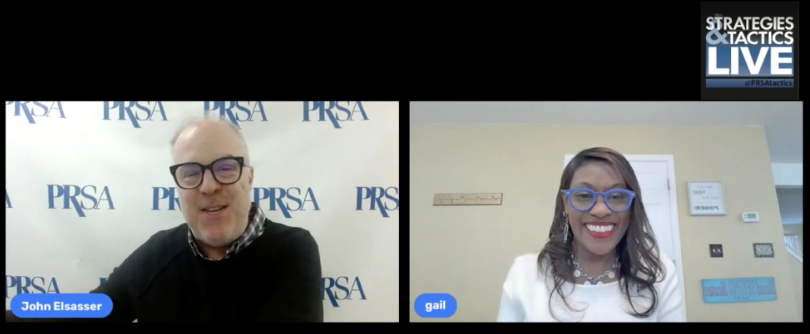When she was growing up in Louisville, Ky., Gail Dent’s Sunday afternoons were spent watching sports on television with her family. Her parents were both sports fans, especially her dad.
“Sunday was like a daddy-daughter day,” she recalled. Her father would have two TVs going simultaneously, each showing a different football game. “He would be in his big chair; I would be in my little chair right beside him, cheering for teams,” said Dent, the guest on March 14 during Strategies & Tactics Live, PRSA’s monthly livestream on LinkedIn. “Mom would be on the couch, listening and watching us.”
As a child, she saw how much people enjoyed watching sports, live or on television. The impression would prove deep and lasting for her. When she was in high school, Dent knew she wanted to work in sports, but she wasn’t sure in what capacity. She started looking at colleges that offered curriculum in sports management and administration.
Experience helps students stand out.
Later, as a student at Eastern Kentucky University, she wanted to acquire some writing experience besides what she was learning in the classroom. With paid positions already filled by graduate students, she volunteered to work for the school’s sports information director.
To broaden her experience beyond sports, she also volunteered with the university’s public relations office, writing press releases about higher education. She also found time to write stories about the school’s track and field team for its newspaper.
“I knew that I had to get experience in order to move on after graduation,” she said. As she tells students today, “you have four years, maybe five” to be in college. “You have to do a lot within that time frame that sets you apart. Volunteer. Get involved with campus activities.”
After earning her bachelor’s degree in public relations with an emphasis in sports management, Dent went on to earn a master’s degree in sports administration from the University of Kentucky. Today, she is associate director of external communications at the NCAA in Indianapolis.
John Elsasser, editor-in-chief of PRSA’s award-winning Strategies and Tactics publication and host of S&T Live, asked whether her advanced degree has been integral to her career.
“It is important,” she said. “What I tell students, not only student-athletes but students in general, is that if you have the opportunity to get more education, both as a student and later in your career, do it. That experience will help you in the future.”
As with working on diverse teams, when you pursue an advanced degree, “you get different perspectives from people,” she said. I also tell students that, as you’re starting your career, you will begin to look at other job opportunities” that your master’s degree makes you qualified to obtain. As a result, you will face less competition in your career.
She said that more education also brings additional opportunities to think critically, network and build professional relationships, which can make a big difference in one’s career.
Students considering careers in sports communications should remember that the hours can be long, with work during the day, events in the evening, and travel and other time commitments. Still, “I believe that you can have a work-life balance,” Dent said. “As you get farther into your career, you learn how to delegate and prioritize. You learn how to manage.”
During the 30-minute session, which you can watch here, Dent also discussed the importance of DEI in sports communications and improving gender equity between men’s and women’s sports.







